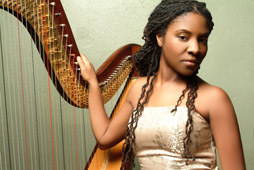By André Green/managing editor
(Part two in a four-part series on faculty winners of the Chancellor’s Award for Exemplary Teaching, an annual award that recognizes professors who impress and inspire their students.)

Samantha Powell has always believed in working hard to achieve her goals, something her parents instilled in her as a child.
Those attributes helped make Powell the SE Campus recipient of the Chancellor’s Award for Exemplary Teaching this year.
Powell, an English native, grew up in South Africa, where, under her parents’ tutelage, she learned the values of hard work, commitment and excellence—the tools she would use toward her dream of becoming a professional tennis player.
“ I wanted to play tennis my whole life,” she said.
Born into an athletic family, Powell believed she would become a pro player.
Her grandfather played soccer until he was 50, and her uncle was Junior Wimbledon champion for three consecutive years.
“ It was a pretty athletic family,” she said.
During her childhood, Powell concentrated on her studies and practiced for hours to perfect her play. She credits her father, an investor, and her mother, a tennis coach, with keeping her focused on her dream.
“ My parents wouldn’t allow me to play any other sports, not even Ping Pong—it would mess up my swing,” she said.
Powell’s dedication would eventually pay off. At 18, she received an athletic scholarship to play tennis in America.
“ That’s what gave me the opportunity to come over here,” she said. “It’s tennis that got me to this country.”
Powell experienced a bit of culture shock in the United States, especially with her fellow college students’ level of discipline.
People had shoulder length hair and wore tennis shoes to class, something that was never allowed in South Africa.
Despite the differences in South Africa and her new home, she remained a dedicated student who found little time for recreational activities.
Her regimen consisted of classes in the morning, followed by a quick lunch before heading to four hours of practice. Afterward, she would head to the library to study.
While taking her lunch breaks, she noticed her roommates watching soap operas and often wondered when they found the time for their studies.
“ I was like, really?” she said. “There was very little downtime for me.”
Powell recalls that during her childhood, she remained so busy she barely had time for activities outside of schoolwork and tennis practice.
“ We got a TV when I was 10. We watched Dallas and this J.R. Ewing, and we were like, wow!” she said. “The entire country would shut down to watch the show.”
Staying committed to her studies was the most challenging aspect of her college career. She had so much on her plate and so little time to do everything. However, she dedicated every minute she had to her coursework.
“ We had a tournament in Ohio, and I was in the back of the bus trying to study bio-chemistry because I had a test on Monday,” she said.
Regardless, Powell became acclimated to life in America but managed to stay on track to accomplish her dream.
As an amateur player, she played against some of the sport’s rising stars in tournaments, one of whom would later be inducted into the tennis hall of fame.
“ I played a couple of the pros, Nathalie Tauziat and Gabriela Sabatini,” she said.
As her tennis career flourished, Powell became intrigued in another aspect of the sport—nutrition.
The science of nutrition fascinated her. When she later interned at Harris Methodist Hospital, Powell most enjoyed the ability to interact with people by helping them change their lives and improve their health.
Her own life would change, and her tennis career would abruptly end.
During her last semester of eligibility, Powell was tracking down a lob when she landed awkwardly on her right foot, breaking her ankle. She wanted to continue playing, but when she noticed her foot changing colors, she knew her match, and possibly her promising career, was over.
Anyone else might have given up, but Powell was already focusing on her next career.
Powell received her bachelor’s in dietetics at the University of Wisconsin and her master’s in nutrition at Texas Woman’s University, graduating with a 4.0 grade point average.
During the summer, she worked in Gainesville as a nutritional assistant and counselor at Camp Sweeney Diabetic Camp for Children.
She poured all of her energy into her new career just as she did with tennis. She strived to be the best, no matter where she was or what she was doing.
The people she worked for and with, she said, were her motivating factors.
In 1994, Powell left Texas to serve as the assistant chief clinical dietician at Jack D. Weller Hospital of the Albert Einstein College of Medicine in the Bronx for a year before returning to North Texas.
She was a private consultant for a few years in the metroplex before becoming the coordinator and instructor of dietetics on SE Campus.
In June 2004, Powell’s hard work was rewarded when she became the department chair of culinary arts, dietetics and hospitality management, a job she refuses to look past.
“ I enjoy what I do now,” she said. “I may at some point get my Ph.D, but for right now, I’m going to stay and do what I’m doing.”
Her enthusiasm and willingness to teach is reflected through her students’ comments about her.
“ She is a blessing to a student like me, who really needs the impact of this valuable course,” one student wrote in an anonymous student appraisal.
Another added, “She is very personable, pleasant and energetic. She is easy to talk to … [her] door is always open.”
Powell considered it an honor to be nominated for the Chancellor’s Award for Exemplary Teaching. However, she said her greatest reward came in the form of a letter she received from a former student.
“ Samantha Powell is truly doing God’s work,” Vicki Catlin, patient supervisor at Arlington Memorial Hospital, wrote. “[She] is not just an exemplary teacher. She fosters a powerful learning environment and imposes a drive to succeed. There are many wonderful teachers, but few that set your soul on fire.”
Before her award became official, Powell said Catlin’s letter made her feel like a winner.
“ For a student to write something like that—that’s actually your goal,” she said.



























